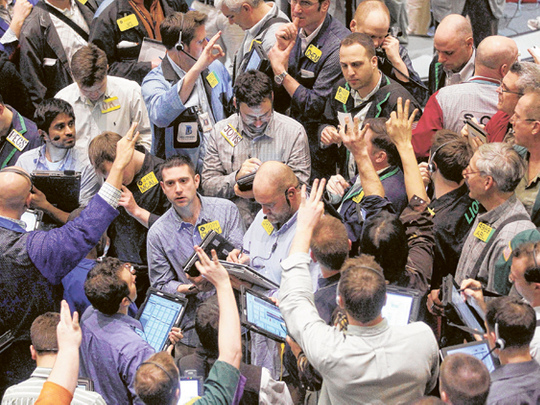
London: Oil prices fell yesterday but held near two-and-a-half year highs, with Brent crude close to $121 (Dh444.36) a barrel, on unrest in oil exporting countries in the Middle East and Africa.
A Western air strike destroyed two of Muammar Gaddafi's military vehicles in the east Libyan oil town of Brega yesterday allowing rebels to edge forward, but diplomatic efforts to end the war remained stalled.
The stalemate fuelled fears of a prolonged loss of oil exports from Libya despite reports that a first cargo of crude oil is due to be loaded by rebels yesterday.
Brent crude for May fell 42 cents to $120.64 a barrel at 12.13 GMT, after closing at $121.06 a barrel on Monday, the highest settlement since August 1, 2008.
US crude was 47 cents lower at $108 a barrel after settling at $107.78 on Monday, the highest since September 22, 2008.
"It's looking overbought and we might see a bit of a correction now, but now that Brent has broken above $120 it's hard to put a top on it," said Rob Montefusco, an oil trader at Sucden Financial.
The fourth Chinese interest rate increase since October briefly triggered a decline of around $1 a barrel in oil prices, but markets pared the bulk of losses on reports of further clashes in West Africa yesterday.
"The market doesn't seem that bothered about Chinese interests rates any more, which seems totally crazy to me," said David Morrison, a strategist at GFT.
The perception of tight fundamentals has helped trigger price gains on relatively small output interruptions, which have been compounded by the erosion of spare capacity from top exporter Saudi Arabia, analysts said.
Spare capacity
"Spare capacity is eroding and together with the geopolitical backdrop where Nigerian outages are very much on the cards with the upcoming elections, upward pressure on prices could well continue," said Amrita Sen, an analyst at Barclays Capital.
The kingdom has raised supply and introduced lighter grades of oil to help fill in for missing Libyan output, but traders question how much more room for output increases remains.
Worries about oil supply also focused on Nigeria after elections there were postponed by a week due to logistical problems, sparking fury among voters who were promised a break with a history of flawed and violent polls.
Nigerian militants have previously hit supplies of the country's oil, a sweet crude that has jumped to a premium as a result of the Libyan outages.
"We have already lost good grades in Libya, and now the elections in Nigeria are providing further potential upside," Sucden Financial oil trader Montefusco added.











